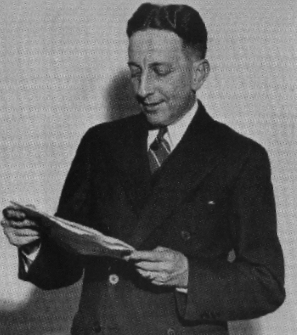
Thomas Knight has often been portrayed as the bad guy (along with the bad woman, Victoria Price) in retellings of the Scottsboro Boys story. In the movie "Judge Horton and the Scottsboro Boys," the actor playing Knight is given inflammatory and anti-semitic lines like "show them that Alabama justice can not be bought and sold with Jew money from New York" that were actually uttered by his co-prosecutor, Wade Wright. Although Knight himself was not above offering offensive and prejudicial remarks (for example, in his summation he referred to Haywood Patterson as "that thing"), in comparison to Wright he comes across as a voice of moderation as when he told the jury, "I do not want a verdict based on racial prejudice or relighious creed." Ruby Bates, in cross-examination by Knight, said "Yes" when asked whether it was true that in his initial interview of her he told her that he "did not want to burn any person that wasn't guilty."
Knight was born in Greensboro in 1898, the son of Thomas E. Knight, Sr., who would later serve as a justice on the Alabama Supreme Court and write the majority opinion in 1932 upholding the verdicts and death sentences in the initial Scottsboro trials. Thomas Knight, Jr. unsuccessfully defended his father's opinion in oral arguments before the United States Supreme Court. The Court's decision in Powell vs. Alabama sent the cases back to Alabama for retrial. Knight, having been elected Attorney General of Alabama in 1930, chose to assume the role of lead prosecutor in the Patterson trial before Judge Horton in 1933. He would also head up the prosecution team in the trials before Judge Callahan in late 1933 and early 1934.
In the courtroom, Knight was brusque and aggressive, often standing within a few feet of defense witnesses, raising his voice to a near shout, sometimes even sticking a finger within a few inches of a witness's face. Knight had numerous, heated encounters with defense attorney Samuel Leibowitz. Knight viewed his attack on the Alabama jury system as "an attack on the sovereignty" of the state. When asked by Liebowitz to address black witnesses as "Mr." rather than by first names, Knight replied, "I am not in the habit of doing that." Knight effectively attacked the credibility of key defense witnesses Bates and Lester Carter by accusing them of having sold out for fancy clothes. Bates, he said "sold out" for "a gray coat and a gray hat."
After the Supreme Court again reversed the convictions of the Scottsboro Boys in 1936, Knight met secretly with Leibowitz in New York to discuss a possible compromise. He told Leibowitz he was "sick of the cases," and that they were causing Alabama considerable political and economic harm. According to Leibowitz, Knight by that time had come to believe that Price was lying and no rape had ever occurred. Nonetheless, he thought jail time appropriate because at least some of the Scottsboro Boys were guilty of assault for having thrown the white boys off the train. After several meeting between the two, a compromise was reached that would result in the release of four of the boys and a reduction of sought charges for the others. The compromise was never carried out in full by the state because Knight died in May, 1937, and the new acting attorney general feared "looking soft" on rape.
